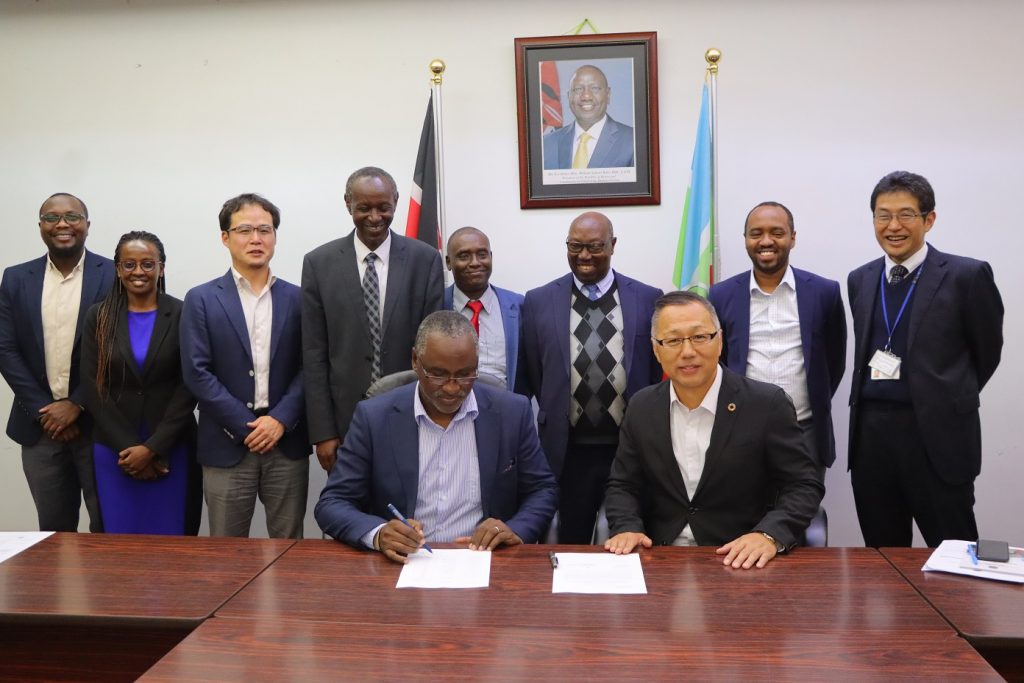
DVC Academic Affairs, Prof. Robert Kinyua and Mr. Kenji Hayashi sign documents to officially hand-over recycling plant to JKUAT
The Japan International Cooperation Agency (JICA) has officially handed over a state-of-the-art plastic bottle recycling plant to Jomo Kenyatta University of Agriculture and Technology (JKUAT).
This initiative, known as the “SDGs Business Verification Survey with the Private Sector for Development of Material Recyclers of Used Polyethylene Terephthalate (PET) Bottles,” aims to tackle the issue of PET bottle waste by converting it into high-value pellets for local industry use.
The purpose of the project is twofold. First, it aims to mitigate environmental impact by recycling PET bottles, thus reducing the environmental footprint associated with plastic waste.
Second, it seeks to add economic value by producing high-value pellets from recycled PET bottles, which will be used in local industries. This fosters economic growth and promotes sustainable industrial practices.
During the handing over ceremony July 17, 2024, the Vice Chancellor, Prof. Victoria Ngumi, represented by the Deputy Vice Chancellor in charge of Administration and Finance, Prof. Bernard Ikua, welcomed the JICA team led by Mr. Kenji Hayashi, the JICA Senior Representative in Kenya.
Expressing gratitude for the handing over of the PET recycling plant, the Vice Chancellor emphasized the project’s significance in processing used PET bottles into high-value pellets for local industry use.
Prof. Ikua highlighted the project’s milestones, including the training of JKUAT staff in Japan and the successful setup of the recycling plant. He added that the project, now an industry within the university, will be used to train both students and staff.
He underscored the economic and environmental benefits of the project, noting that the plant’s capacity to process 500 kg of PET flakes per hour and produce 250 kg of pellets per hour supports local industries while promoting environmental sustainability.
Prof. Ikua acknowledged JICA for their strong support to JKUAT over the years, which he noted, has greatly benefited JKUAT’s training and research initiatives. Prof. Ikua reaffirmed the university’s commitment to leveraging this support to provide quality education and conduct impactful research, contributing to national development goals.
Mr. Kenji Hayashi thanked JKUAT for the long-standing partnership in various projects. He noted that this project symbolizes a close collaboration between the government and the private sector, highlighting its effectiveness in addressing significant environmental and economic challenges.
Mr. Hayashi emphasized that the successful implementation of the PET recycling plant demonstrates the power of international cooperation and joint efforts in achieving sustainable development goals.
The Manager of TOBE Shoji Co. Ltd, Mr. Tomonori Kanaizuka expressed his gratitude to JKUAT and other project partners. He highlighted the advanced recycling technology provided by TOBE Shoji and its potential to significantly impact local industries by supplying high-quality recycled materials. The manager reiterated the company’s commitment to supporting sustainable practices and contributing to environmental conservation efforts in Kenya.
The project brings together a diverse group of collaborators and local partners. JKUAT, through the Institute of Energy and Environmental Technology (IEET), leads the academic and research efforts, providing the necessary expertise and facilities.
While JICA, as the primary funding and support agency, facilitates international cooperation and technology transfer. TOBE Ltd. and the National Chemical Trading Company from Japan are technical partners, providing advanced recycling technology and expertise.
The Environmental Technology Africa Ltd. focuses on environmental sustainability as a local partner, while local stakeholders include the National Environment Management Authority (NEMA), Kenya Association of Manufacturers (KAM), PAKPRO, and Kenya Bureau of Standards (KEBS), ensuring regulatory compliance, industry engagement, and standardization.
Source: JKUAT
